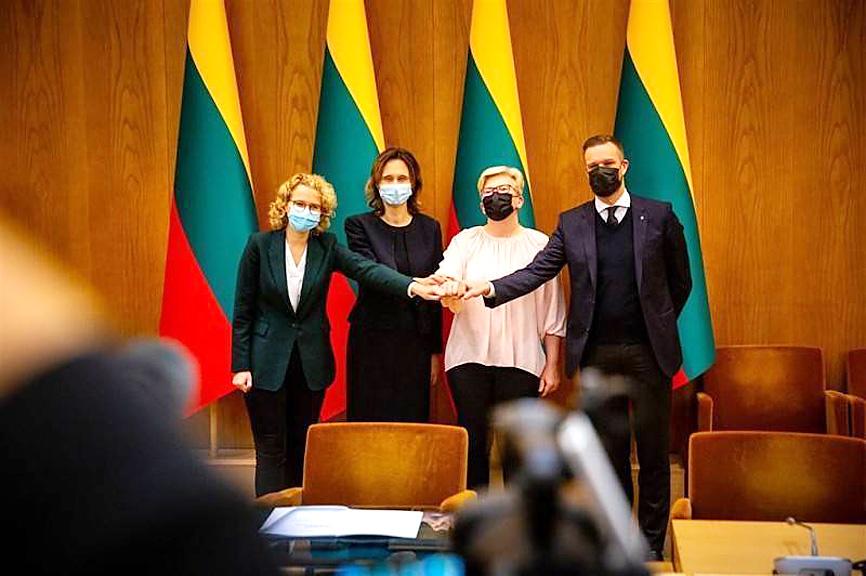Lithuania plans to open a representative office in Taiwan, and leave a Beijing-led alliance with central and eastern European nations, Lithuanian Radio and Television (LRT) quoted a lawmaker as saying on Tuesday.
The Ministry of Foreign Affairs said it welcomes countries willing to establish friendly relations with Taiwan, but added that it has no additional information on the matter.
The Lithunian Committee on Foreign Affairs last month agreed that the Baltic nation should leave China’s 17+1 initiative to bolster cooperation between Beijing and 17 European nations, the LRT report said.

Photo: Screen grab from Facebook
“China has aims to take over strategic infrastructure in various countries... Why should we embroil ourselves in these risks?” Lithuanian Committee on Foreign Affairs Chairman and former diplomat Zygimantas Pavilionis was quoted as saying in the report.
Estonia, Latvia and several other east European nations are thinking of taking similar steps, he said, adding that Lithuania plans to expand relations with Taiwan by opening an economic office in the country.
Lithuanian Minister of Foreign Affairs Gabrielius Landsbergis told LRT that the cooperation program with Beijing has brought Lithuania “almost no benefits.”
“The 17+1 initiative ... is not useful for Europe; it is dividing Europe, because countries have different opinions on China,” he said.
“I am not saying that we are leaving [the alliance] and that it is the end, but we should consider what is a useful way of building a relationship with China,” he added.
Lithuania is not alone in its reluctance to continue working with China, as evidenced by the Chinese and Central and Eastern European virtual summit held on Feb. 9, during which the three Baltic states, along with Bulgaria, Romania and Slovenia, sent ministers instead of their head of state or government.
In April last year, 50 Lithuanian members of parliament, along with more than 200 political and intellectual figures, wrote a joint letter to Lithuanian President Gitanas Nauseda expressing their support for Taiwan to join international organizations and to establish an office in Taiwan.
The move is in line with the promise made by Lithuania’s coalition government in November last year that it would “actively oppose any violation of human rights and democratic freedoms, and will defend those fighting for freedom around the world, from Belarus to Taiwan.”
In Taipei, ministry spokeswoman Joanne Ou (歐江安) yesterday said that Taiwan is open to making friends with nations around the world and welcomes any move that would deepen Taiwan-Lithuania relations.
However, the ministry has no further information regarding Lithuania’s reported plan to establish a representative office in Taiwan, she said.
As for the Baltic nation’s plan to leave the 17+1 platform, the ministry has no comment, she said.

The US government has signed defense cooperation agreements with Japan and the Philippines to boost the deterrence capabilities of countries in the first island chain, a report by the National Security Bureau (NSB) showed. The main countries on the first island chain include the two nations and Taiwan. The bureau is to present the report at a meeting of the legislature’s Foreign Affairs and National Defense Committee tomorrow. The US military has deployed Typhon missile systems to Japan’s Yamaguchi Prefecture and Zambales province in the Philippines during their joint military exercises. It has also installed NMESIS anti-ship systems in Japan’s Okinawa

‘WIN-WIN’: The Philippines, and central and eastern European countries are important potential drone cooperation partners, Minister of Foreign Affairs Lin Chia-lung said Minister of Foreign Affairs Lin Chia-lung (林佳龍) in an interview published yesterday confirmed that there are joint ventures between Taiwan and Poland in the drone industry. Lin made the remark in an exclusive interview with the Chinese-language Liberty Times (the Taipei Times’ sister paper). The government-backed Taiwan Excellence Drone International Business Opportunities Alliance and the Polish Chamber of Unmanned Systems on Wednesday last week signed a memorandum of understanding in Poland to develop a “non-China” supply chain for drones and work together on key technologies. Asked if Taiwan prioritized Poland among central and eastern European countries in drone collaboration, Lin

BACK TO WORK? Prosecutors said they are considering filing an appeal, while the Hsinchu City Government said it has applied for Ann Kao’s reinstatement as mayor The High Court yesterday found suspended Hsinchu mayor Ann Kao (高虹安) not guilty of embezzling assistant fees, reducing her sentence to six months in prison commutable to a fine from seven years and four months. The verdict acquitted Kao of the corruption charge, but found her guilty of causing a public official to commit document forgery. The High Prosecutors’ Office said it is reviewing the ruling and considering whether to file an appeal. The Taipei District Court in July last year sentenced Kao to seven years and four months in prison, along with a four-year deprivation of civil rights, for contravening the Anti-Corruption

NO CONFIDENCE MOTION? The premier said that being toppled by the legislature for defending the Constitution would be a democratic badge of honor for him Premier Cho Jung-tai (卓榮泰) yesterday announced that the Cabinet would not countersign the amendments to the local revenue-sharing law passed by the Legislative Yuan last month. Cho said the decision not to countersign the amendments to the Act Governing the Allocation of Government Revenues and Expenditures (財政收支劃分法) was made in accordance with the Constitution. “The decision aims to safeguard our Constitution,” he said. The Constitution stipulates the president shall, in accordance with law, promulgate laws and issue mandates with the countersignature of the head of the Executive Yuan, or with the countersignatures of both the head of the Executive Yuan and ministers or